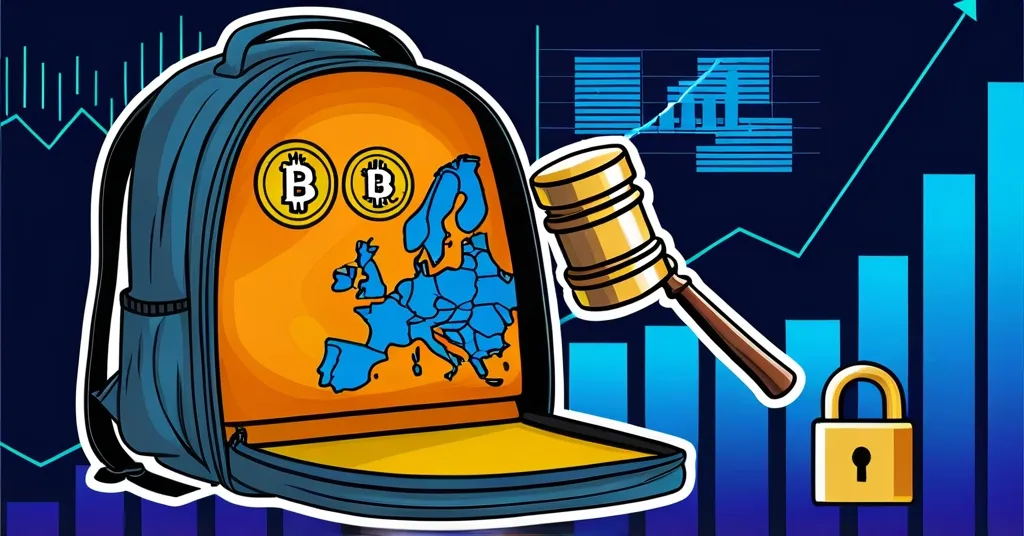Backpack Exchange Acquires FTX EU, Launches Regulated Crypto Trading in Europe

Backpack Exchange Acquires FTX EU, Launches Regulated Crypto Trading Across Europe
Backpack Exchange has taken a bold leap into the European market with the acquisition of FTX EU, the former European arm of the now-defunct FTX. This move, greenlit by the FTX bankruptcy court and the Cyprus Securities and Exchange Commission (CySEC), positions Backpack to offer regulated crypto derivatives, including perpetual futures, throughout the European Union. As the crypto landscape continues to grapple with the fallout of high-profile failures, Backpack’s entry into the EU market is a game-changer, filling a gap left by the exodus of unregulated offshore exchanges.
- Backpack acquires FTX EU, expanding to the EU market.
- Regulated crypto derivatives offered across the EU.
- Customer restitution prioritized with distribution of FTX bankruptcy claims.
- Integration with SEPA planned for Q1 2025 launch.
Backpack Exchange’s acquisition of FTX EU isn’t just about business expansion; it’s a bold stride towards a more regulated and trusted crypto market in Europe. In a world where trust is currency, this move signals a commitment to transparency and security. “As many international exchanges exit the European Union, becoming a MiFID II-licensed entity demonstrates our dedication to meeting the highest regulatory standards and is a significant step to bringing transparent, secure, and regulated crypto trading to an underserved European market,” stated Armani Ferrante, CEO of Backpack Exchange. MiFID II, or Markets in Financial Instruments Directive II, is a set of European regulations aimed at increasing transparency and protecting investors in financial markets.
This acquisition allows Backpack to dive into a full suite of regulated crypto derivatives, including perpetual futures. Perpetual futures are a type of derivative contract that allows traders to speculate on the future value of cryptocurrencies without an expiration date, which is particularly appealing in the volatile crypto market. By obtaining a MiFID II license, Backpack EU can provide the kind of transparent and secure trading that the European market desperately needs, especially in the wake of stricter regulations like the Markets in Crypto-Assets (MiCA) regulation.
A critical aspect of this acquisition is customer restitution. Backpack EU will take on the heavy lifting of distributing the previously court-approved FTX bankruptcy claims to former FTX EU customers. “Customer restitution is a crucial step to rebuild trust and confidence in the industry, and Backpack is committed to returning FTX EU customers’ funds as fast and as safely as possible,” Ferrante emphasized. This focus on restitution aligns with the broader industry’s efforts to rebuild trust after the FTX debacle.
To further enhance its offerings, Backpack EU plans to integrate with traditional payment systems like the Single Euro Payments Area (SEPA). SEPA allows for instant and low-cost euro transactions across the EU, which could be a game-changer for crypto adoption in Europe. By linking with SEPA, Backpack EU users will enjoy seamless and cost-effective transfers, potentially attracting a broader user base accustomed to traditional banking systems. The platform aims to launch in the first quarter of 2025, marking a new era of regulated crypto trading in Europe.
Backpack Exchange isn’t just another player in the crypto game. Serving users from over 150 countries with a trading volume exceeding $60 billion, it’s part of a broader ecosystem that includes Backpack Wallet and the Mad Lads NFT community within the Solana ecosystem. This comprehensive approach positions Backpack as a leader not only in trading but also in fostering a vibrant crypto community.
While this acquisition is a significant step forward, it’s not without its challenges. Regulatory compliance, though beneficial, can be a double-edged sword. It ensures transparency and security but also imposes stringent requirements that could slow down innovation. Moreover, the crypto market is notoriously volatile, and Backpack will need to navigate these waters carefully to maintain its competitive edge. Regulatory compliance might be a necessary evil, but it’s a ball and chain that could slow down Backpack’s race to innovate.
Despite these challenges, the potential benefits are immense. By offering regulated crypto derivatives, Backpack can attract institutional investors who have been wary of the unregulated nature of many crypto platforms. This could lead to increased liquidity and stability in the market, a win for everyone involved. Backpack isn’t just stepping into FTX’s old shoes; it’s aiming to sprint in them across the European market.
The broader implications of this move extend beyond Backpack. The European crypto market is poised for a shake-up, with potential competitors like Binance and Coinbase also vying for a piece of the pie. Bitcoin maximalists might argue that this move towards regulation is a double-edged sword, bringing stability but potentially at the cost of decentralization. However, the reality is that regulated platforms can coexist with decentralized systems, each serving different needs within the crypto ecosystem.
In the face of these challenges, Backpack’s acquisition of FTX EU is a bold step towards a more regulated, secure, and transparent crypto ecosystem. And in a world where trust is currency, that’s a move worth watching.
What does the acquisition of FTX EU mean for Backpack Exchange?
The acquisition allows Backpack Exchange to expand its operations into the European Union, offering regulated crypto derivatives including perpetual futures, and filling a market gap left by exiting unregulated offshore exchanges.
How will Backpack EU handle customer restitution from FTX EU?
Backpack EU will undertake the responsibility of distributing the previously court-approved FTX bankruptcy claims to former FTX EU customers, aiming to rebuild trust and confidence by returning customers’ funds as quickly and safely as possible.
What regulatory compliance is Backpack EU committed to?
Backpack EU is committed to meeting the highest regulatory standards, as demonstrated by its MiFID II license, ensuring transparent, secure, and regulated crypto trading in the European Union.
When is Backpack EU expected to launch?
Backpack EU aims to launch in the first quarter of 2025.
What additional services will Backpack EU offer?
In addition to regulated crypto derivatives, Backpack EU will integrate with traditional payment rails, including instant and low-cost SEPA payments and wire transfers in major currencies across the EU.

